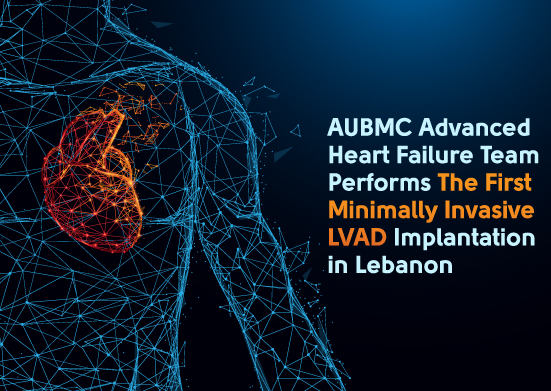
The AUBMC Advanced Heart Failure team performed the first minimally invasive LVAD implantation in Lebanon on August 19, 2019. The surgery was performed on a 55 year old gentleman with dilated cardiomyopathy whose condition progressed despite optimal medical therapy. The surgery is being done as a bridge to heart transplantation strategy.
Left ventricular assist devices are mechanical pumps that support the function of the failing heart. They are indicated in patients with advanced heart failure who are not legible for medical and other device therapy.
The Advanced Heart Failure team who performed the first LVAD in the region on August 2009, continues to provide cutting edge therapies to patients with this difficult condition. Now, ten years later, and with the continuous advancement in this technology, the first minimally invasive LVAD implantation was successfully performed.
Members of the team include Dr. Hadi Skouri, a Heart Failure and Heart Transplantation specialist and Director of Samir Alam Heart Failure Unit and Cardiac Care Unit, Dr. Jamil Borgi, Cardiothoracic surgeon with heart and lung transplantation subspecialty, Dr. Pierre Sfeir, Head of cardiothoracic division at AUBMC in addition to a number of nurses and coordinators specialized and experienced in the management of LVAD and heart failure patients.
The use of left ventricular assist device (LVAD) as bridge-to-transplant and destination therapy has increased significantly in the recent years along with the rapidly increasing heart failure patient population worldwide,” said Dr. Hadi Skouri. He continued, “In Lebanon, and since our first implantation in the region, more patients are referred for advanced heart failure therapies. With the advancement of mechanical circulatory support, the smaller and current generation of continuous-flow LVADs has made minimally invasive LVAD implantation feasible. The heart failure specialist role is essential in selecting patients, optimizing them prior to surgery, as well as treating them around the time of surgery and on long term basis.”
Dr. Borgi, cardiothoracic surgeon specialized in advanced heart failure therapy, reported that the minimally invasive approach of avoiding a full sternal incision, can reduce surgical trauma and make subsequent LVAD removal and heart transplantation less technically challenging. It will also allow patients to have a faster recovery. Though this minimally invasive procedure cannot be performed on all patients needing this therapy, appropriate selection is pivotal to the success of this surgery.
Data have shown, the current generation of LVADs are more durable, and are associated with fewer complications and better survival as Dr Sfeir explained. With the current shortage of organ donors particularly in countries like Lebanon, LVAD therapy proved to be a very acceptable alternative for patients with advanced hear failure.
The Advanced Heart Failure team at AUBMC was initiated in 2009 and many successful stories have been accomplished to date.
AUBMC, as always, aims to be the leader in providing the most advanced technologies and the best care for patients in Lebanon and the region.